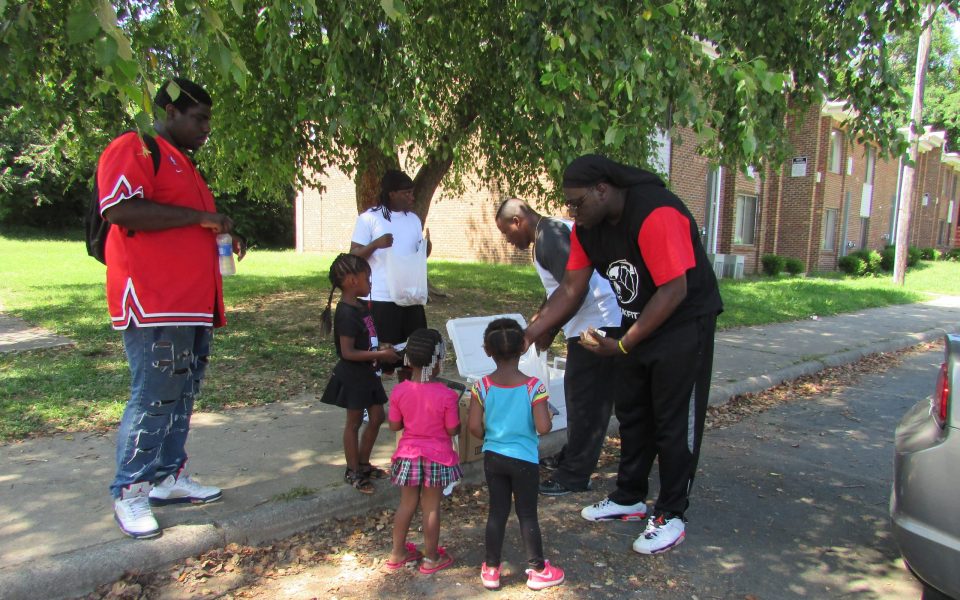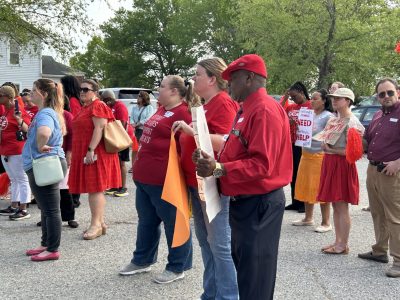Volunteers who are distributing free food and clothing in response to a crisis at a lower-income housing community and chronic homelessness in Winston-Salem view themselves as a movement.
Cedric Duke, an imposing bouncer with a linebacker’s build, slides out of the backseat of Jennifer Blue’s Dodge Charger, right leg extended, after she pulls into a space in the Rolling Hills apartment complex on a recent Friday afternoon.
Duke, who wears an Airtype T-shirt inscribed with the words “Winston-Salem, City of Industry,” limps to the curb and suggests that Blue back the car to the sidewalk so they can unload food from the trunk. Duke’s hobbled condition is the result of knee surgery two days earlier, made necessary when an intoxicated club patron hit him with a car on a sidewalk. “I had told him I was gonna take his keys away,” Duke later explains, “and I should have done it.”
Duke and Blue haul out cardboard boxes of pre-packaged meals — hamburgers, corn and mashed potatoes. They also have cheese sticks, single-serving containers of Honey Nut Cheerios and cartons of milk — plain and chocolate. The food comes from an anonymous donor, Duke says. Christopher “Kountry Kane” Camps and Herman Wanshiya, having followed Duke and Blue over in a separate car, amble over to help hand out food.
“Y’all tell ’em we’re feeding out here,” Duke calls out across the lawn to one of the apartment buildings. Three girls and a young man soon materialize, and Duke hands them each meal packages, as Kountry doles out milk cartons.
“Here you go, baby,” Blue says as she hands one of the girls a cereal container. “Want some cheese?”
“Is there some more kids?” Duke asks. “Tell ’em to come on and eat.”
So it goes: Clusters of unattended children, moms, young guys and older men gravitate to the Charger. One says he’ll tell a family he knows to be hungry about the food, and another offers to bring some meals to someone who doesn’t get around very well. After about 30 minutes, it appears that everyone has food who wants it, and the four volunteers start talking about heading over to the Bethesda Center for the Homeless to serve another meal.
Duke and his friends have been coming to Rolling Hills to serve food every day for the past couple weeks since learning that the apartment complex was in a state of virtual collapse, with lack of running water and electricity, an infestation of roaches and bedbugs, and in some cases, raw sewage running over the floors. Plagued with a reputation for violence, the apartment complex was transferred from the Housing Authority of Winston-Salem to a real-estate investment group based in southern California in 2011, then sold again to two partners in New Jersey in 2014. City inspectors have found multiple code violations, and city officials are pledging to relocate families and find new owners. Meanwhile, on this sweltering Friday afternoon many residents are sitting outside in the shade to get relief from units without functioning air conditioning.
Duke has been serving food to homeless people at the Bethesda Center for several years, but his work as a bouncer led to his involvement in the community relief effort at Rolling Hills. The mother of a black man who was killed earlier this year asked Duke and Kountry to provide security at a Stop the Violence Cookout on June 25. That’s where Duke met Effrainguan Muhammad of the Nation of Islam, who invited him to a weekly meeting held every Thursday evening at the Carl Russell Recreation Center, where residents share information and coordinate action on various community challenges.
“I told them: ‘Until this problem is solved I will be out here to feed people,’” Duke says.
Blue, a playwright and domestic violence advocate from Detroit, joined forces with Duke because of her interest in outreach to people experiencing homelessness. She mentions that she’s a survivor of domestic violence and was formerly homeless herself.
“We as a community have to take care of one another,” she says. “Sixty-three percent of homeless women are homeless because of domestic violence. It goes hand in hand.”
Kountry and Wanshiya both got involved because of their former boss, Eric Pegues, a hip-hop promoter who was fatally shot outside the Paper Moon Gentlemen’s Club in late May. Pegues had helped Blue, and encouraged his employees to get involved. Kountry and Wanshiya donated money, but didn’t volunteer their time at first. Kountry says that, far from Pegues’ social outreach functioning as PR for his business, he threw parties so he could raise money to provide for social needs, including buying a prom dress for a high school student and paying for friends’ funerals. Kountry says the night Pegues was killed what most excited him was plans to serve food to homeless people with Duke the next day.
“Everybody’s not blessed to get three meals a day,” Kountry says. “Kids is innocent. For it to get better, we’ve got to educate them on how to live, how to be successful.”
A natural leader, Duke makes a point to share credit for the outreach efforts at Rolling Hills and other communities of need across the city. His prolific Facebook presence, including periodic live streams and updates that highlight needs while thanking others for their assistance, has contributed to a near viral response. He mentions a woman from Concord named Christina Lefler who drove to Winston-Salem to personally delivery 28 cases of water. He scrolls through his mobile phone to display photos of volunteers manning shop-vacs to remove raw sewage from some of the apartment units.
The Irie Rhythms restaurant has donated food, he says. Courtney Porter-Thompson, who runs the Positive Image Performing Arts dance studio, has offered to pick up the children and provide free dance lessons. Scrolling through his Facebook messages, Duke points out a woman from Kingston, Jamaica who is asking how she can contribute children’s clothing, and another message from a woman in Toronto pledging to send cash.
Duke and his crew are not the only ones providing food at Rolling Hills, as he’s quick to mention. He notes that a woman would be bringing a food truck the following Sunday afternoon, and the Key Club would be holding a cookout later in the afternoon.
True to Duke’s word, as he and Blue roll out of the parking lot in her Charger, five souped-up cars with oversized wheels roar into Ferrell Court, circle the roundabout at the far end of the complex and then parade into the main parking lot, revving their engines to a deafening roar to announce their presence as they prepared for the cookout.
Duke’s Social Heart outfit and the Key Club are not the only street-style freelance food-relief crews. In addition to a host of churches, a hip-hop performer named John Pollock, who performs under the name Piiiiipe, runs Offering to a Hungry Nation. On the same day Duke’s crew is distributing food at Rolling Hills and the Bethesda Center, Pollock is driving up to the Northside Shopping Center to deliver clothes and canned goods to a woman with six children. The next day he’ll host and cookout at a location near the intersection of Martin Luther King Jr. Drive and East Fourth Street. Pollock and Duke have collaborated on cookouts and pizza parties in the past.
At the Bethesda Center, Duke and Blue give out the rest of the pre-packaged meals and most of the remaining chocolate milks. Duke announces that Kountry and Wanshiya will be coming along later with sandwiches and fruit. He asks some volunteers from the center to set up folding tables in the parking lot to prepare for the next meal.
Duke chats with Robert A. Baldwin III, a volunteer at the center with an earnest manner whose forearm and neck bear tattoos — “pimp” on his forearm and “Wu-Tang Clan” on his neck, respectively. Baldwin, who moved to Winston-Salem from Miami, reveals that he lives with schizophrenia and reports to Duke that he’s working on obtaining permanent housing and going to court to clear up some legal trouble. Duke mentions in turn that Baldwin is often good for a $5 contribution.
While Duke is engaged in another conversation, Baldwin quietly confides, “I got a Hallmark card [for Duke] inside; I want everyone to sign it. I don’t have a job right now, but I figured I can afford a $5 Hallmark card.”
Duke is talking about the generosity of the poor, and about a posture of humility when serving the poor that comes from recognizing that anyone could be in the same situation. Vance Clark, wearing a Carolina jersey, picks up the thread.
“Hope is something you can’t see,” he says. “He gives us hope. Once you get that meal you can go out and look for a job. Without that donation, there’s no food here. It’s just a step. Faith is something that’s not seen. I believe in this place, but I also believe that there’s going to come a time when I’m no longer going to need to be in this place.”
Join the First Amendment Society, a membership that goes directly to funding TCB‘s newsroom.
We believe that reporting can save the world.
The TCB First Amendment Society recognizes the vital role of a free, unfettered press with a bundling of local experiences designed to build community, and unique engagements with our newsroom that will help you understand, and shape, local journalism’s critical role in uplifting the people in our cities.
All revenue goes directly into the newsroom as reporters’ salaries and freelance commissions.





Leave a Reply